Coup Govt Seeks to Bankrupt State Airline

Coup Govt Seeks to Bankrupt Bolivian State Airline
March 3, 2020
Translated and edited by Walter Lippmann for CubaNews.
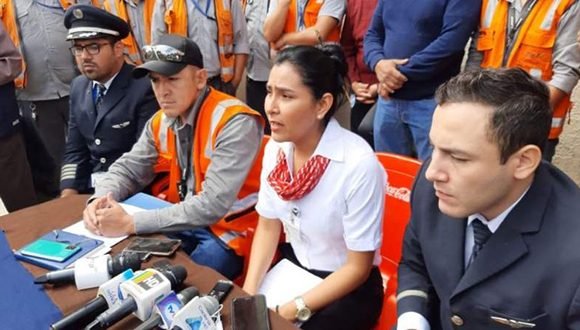
BoA workers declare a state of emergency. Photo: Radio Kausachun Coca.
Base workers of the Bolivian Aviation Company (BoA) declared a state of emergency after not being attended by the Ministry of Public Works, and asked to hold a meeting with President Jeanine Añez to learn about the situation of the state company.
The representative of the BoA collective, Francia Gonzales, expressed her fear and that of the other workers of the airline that the same pattern that occurred with the companies Lloyd Aéreo Boliviano (LAB) and Aerosur, which went bankrupt last decade, will be repeated.
“This is precisely the reason for this mobilization. Our company is gradually going into decline and this is the concern of all the workers. Many of them, former officials of LAB and Aerosur, are seeing the same steps, the same as what has happened with other companies, we are focused on the same path,” emphasized Gonzales.
This Tuesday, BoA’s president, Juan Carlos Ossio, denounced a loss of at least $50 million during the last four administrations of the Movement Towards Socialism (MAS).
“Boliviana de Aviación does not escape the logic that the country has been suffering systematically. MAS never tires of saying that it delivered an armored economy, and as we are seeing little by little, BoA is just another one of the badly managed companies that is showing a loss of more than 50 million dollars,” said Ossio.
The manager of the state-run company also considered that the rank and file workers are in a “plot”. In response to this statement, Gonzales said that the state airline workers “are not in a plot, but that the plot is coming from management” by cutting BoA’s schedule.
“At no time do we as workers intend to stop operations, that would be a plot. The plot we are seeing is from management making bad decisions in cutting routes, cutting catering and other types of services,” he added.
Claudia Mallón, a deputy from Unidad Demócrata (UD), denounced that the state-owned airline BoA failed to receive more than 79 million Bolivians (Bs) due to the reduction of frequencies as determined by the airline’s manager and the “complicit” silence of Public Works Minister Iván Arias.
Toiletries to Become Available

Toiletries are Going to Become Available
Authorities say that April will show some improvement in the supply of toiletries.
As of May and June the situation should be stable in the country.
——————————————————————————————–
by Yaditza del Sol González | internet@granma.cu
and Yudy Castro Morales | yudy@granma.cu
March 4, 2020 00:03:02
Translated and edited by Walter Lippmann for CubaNews.
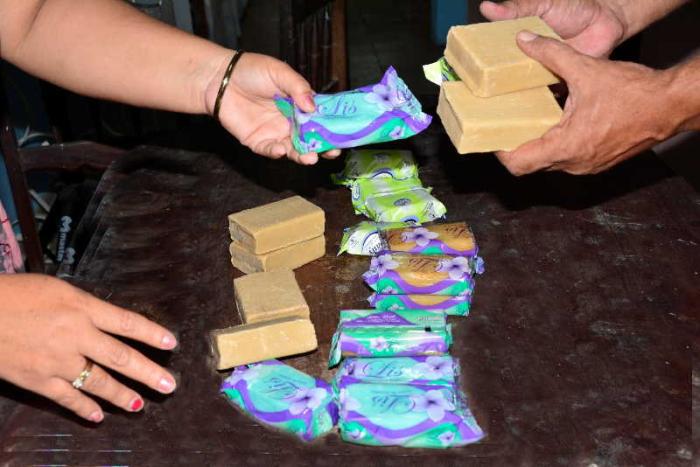
Toiletries, such as soap, toothpaste, liquid detergent and others sold in the retail network, should start to show greater availability in the market, even from March itself. Photo: Vicente Brito
Based on the current conditions of the national industry, the conciliation in terms of production and the assigned financing, the toiletries -such as soap, toothpaste, liquid detergent and others that are sold in the retail stores-must start to show a greater availability in the market, even from this month.
This was announced by Betsy Diaz Velazquez, head of Domestic Trade (Mincin). She explained that now in March, the levels of presence and assurance of these products will show better performance compared to previous weeks, which should go to stability once they begin to recover inventories.
In this regard, she added, April will also show some improvement, and from May and June the situation of sanitation should be stable in the country.
As to why these items are not marketed through the system of the ration book, perhaps as an emerging measure in the face of hoarding and re-sellers, the Minister explained that the toiletries can not be included in the basic family basket, as it would become a controlled product and, therefore, acquire rights.
If we do not have enough to put, for example, one soap per person, and ensure that it reaches the population according to the established cycles, then we can not assume control measures in the register of consumers, said Diaz Velazquez.
“What we can do, and do, is give the authorities of the territory the power to apply regulatory measures in the sale of products in high demand and with insufficient supply on the market. We are not talking about the administrator, but a power of governments and municipal administrations,” he said.
In addition, he insisted, there are certain items that can only market the units of MINCIN, such as Lis and Nacar soap, or liquid detergent Limtel. No one else is authorized, and anyone who incurs in this type of sales is acting illegally.
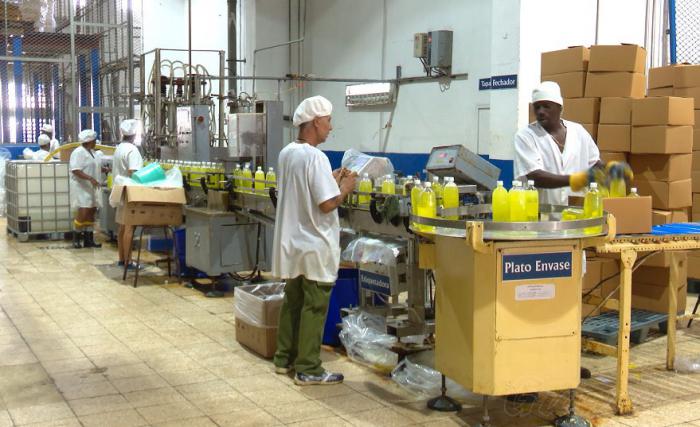
Since February, Suchel has had all the financing required to meet the planned levels of washing and toilet soap, liquid detergent and toothpaste. Photo: Granma Archive
AT THE SUCHEL COMPANY
Carlos Miguel Boggiano Sánchez, Managing Director of the company Suchel, agrees with the words of the head of MINCIN, telling Granma that “in May they will start to gradually improve deliveries, after achieving sustainability in their production and marketing”.
And more than goodwill or an optimistic attitude to support the announced stability, the company has, since February, “all the financing required to respond to the planned levels of laundry and toilet soap, liquid detergent and toothpaste”, products that showed sensitive deficits during 2019 and at the beginning of the year.
This guarantee, stressed Boggiano Sanchez, “marks the difference with respect to previous periods and ensures compliance with contracts for raw materials, as well as their arrival.
To get an idea of the recovery trend shown by the industry, it is appropriate to review the production indices for the first quarter of 2019 and those contemplated for the same stage in 2020.
During the first three months of the previous year, this entity delivered to MINCIN 7,806 tons of cleaning supplies, a figure that represented 16.1% of the 2019 plan.
However, at the end of March, the company must deliver 8296 tons, equivalent to 16,5 % of the forecast for 2020, a schedule that shows growth in the four families of products mentioned.
“From the raw material already available in the market, it is projected to exceed the production of the quarter by 380 tons of washing soap and 500 tons of liquid detergent”, said the CEO of Suchel.
It is precisely this last product, together with toothpaste, that has shown the greatest impact at the beginning of the year. It is estimated that it will recover, as of May, in the following order: detergent, although demand continues to exceed supply; laundry soap, toilet soap and toothpaste.
He said that, so far, the most significant deliveries are concentrated in the provinces of Havana, Matanzas, Villa Clara and Camagüey.
He stressed that as with the stable arrival of raw materials and the continuity of production, the industry, composed of six business units with a productive base, will put its capacities above 95% of use. This is the goal for which all the strategies are designed, from the availability of personnel to the organization of the required work shifts.
And it cannot leave out, from any productive analysis, as Boggiano Sanchez says, the impact of the hostile policy of economic, commercial and financial blockade of the US Government, whose tentacles press each sector of the economy.
The production of shavings, a fundamental raw material for making soap, requires imported oils and fats which, during 2019, in the words of the director, did not reach the country. This is, in addition to financial restrictions, due to the impossibility of tankers to touch Cuban ports, because of the pressures resulting from the unilateral and illegal U.S. sanctions against Cuba.
Of the 21,000 tons of shavings planned in 2019, barely 6,625 were obtained. This year no manufacture has been achieved, since the same constraints persist, not counting the increase in the price of the final product, which involves both the import of shavings and the import of fats and oils in different formats.
Although it might seem an excess, perhaps because of the reiterated nature of the subject, even in the production of soaps the economic blockade wags its tail.
IN DEVELOPMENT NEW LINE OF ECONOMIC PERFUMERY
By 2020, most of the demand of the mixed company Suchel Camacho s.a. is redirected to the network of stores in MINCIN, according to Caridad Estévez García, its sales manager.
In that sense, he said, the range of products is expanded with two new additions to the Daily line: cologne and deodorant. Other existing ones are consolidated, such as soap, children’s dental gel and [insect] repellent. In addition, there are also hair products such as professional dye and shampoo, conditioners and peroxides in large formats.
Likewise, he continued, “we are working on the development of new economic products of perfumery, cosmetics, and cleaning, which contribute to the substitution of imports, and guarantee the relation quality-price-opportunity”.
Together with the MINCIN and the governments of the territories, Suchel Camacho will participate, in the words of Estévez García, in the setting of personalized spaces, with adequate furniture for the positioning of such products.
In a first stage, the work will be done in stores located on Galiano and San Rafael streets in the capital, to be later extended to other establishments in the country.
Food Self-Sufficiency and National Security

Food Self-Sufficiency:
A Matter of National Security
Granma publishes the remarks of Prime Minister, Manuel Marrero Cruz, at the 32nd anniversary of the Urban, Suburban and Family Farming Program in the municipality of Segundo Frente, Santiago de Cuba
Author: Manuel Marrero Cruz | internet@granma.cu
February 16, 2020 21:02:00
Translated and edited by Walter Lippmann for CubaNews.

Photo: Sierra Maestra newspaper
Compañeras and compañeros of the presidency and invited guests;
Delegates to this important work meeting:
More than three decades ago, on December 27, 1987, during a visit to an experience of growing vegetables in quarries enriched with organic matter in Hortifar, an entity belonging to the Military Agricultural Union, the Army General [Raul Castro] indicated to analyze and develop this method of cultivation. This is how the Urban Agriculture Program was born.
Years later, this type of quarry became part of the environment in every corner of Cuba, from the big cities to the small towns.
Then the idea emerged, also from the Army General, to increase the scale of those crops to the lands around the cities, which in their great majority remained unproductive.
As you will remember, this came to be on April 8, 2009, first in Camagüey, within a radius of ten kilometers from the center of the provincial capital. It was called suburban agriculture, and wisely integrated into the by-then already consolidated urban and family agriculture. It was under the direction of comrade Adolfo Rodríguez, known affectionately by all of us as Adolfito. With such passion, responsibility and efficiency he took on the task, practically until the last moment of his life, and to whose commitment we owe a great deal of what was achieved. May this event serve to honor his memory.
The concept has remained unchanged: to generalize a system of food production based on local potential, that is, creating there their own technologies and productive inputs by using the potential available in the territory.
Undoubtedly, since then, progress has been significant. The program has been consolidated as a popular movement of a productive extensionist nature and under agro-ecological principles. This is done with the use of sustainable production technologies, the use of local resources, and the combination of experience and traditions with science and technology.
It is a dynamic, deep, vertical, coordinated and directed work system through the National Group. This has allowed us to achieve positive results and with it, important savings to the country’s economy, contributing to the decrease of input imports.
At a time when the U.S. government has tightened the blockade and everything indicates that it will continue to do so, this project aimed at producing food for the people. It’s something that is not simply another priority, takes on much more importance. It is a vital issue for national security, I repeat, something that is not simply another priority; it is a vital issue for national security, which is equal to preserving our independence and sovereignty.
Today, our country imports $1.65 billion in food for the people, so replacing those imports is strategic. We must commit ourselves to the development of this program and extend its various productive structures to our cities, up to 10 square meters per inhabitant by next year. To take advantage of all available spaces in the cities or towns.
There are plenty of reasons to defend this strategy. In the first place, it is the most economical way of producing food. It can work with a minimum of motor transport and fuel – even without any if necessary – as people can buy them where they are grown, or the transport is a short distance and allows the use of alternative means.
Another very important point: it does not require imports of pesticides or fertilizers. Each hectare of quarry committed must be supported by the amount of fertilizer and other organic inputs needed.
In addition, it guarantees employment for thousands of workers, including women and young people. It is an elementary tool for achieving food security. It contributes to improving water management and nutrient recycling. It allows the use of unproductive, idle or underutilized spaces and is capable of producing the seeds it demands, among other advantages.
All this makes it a realistic and sustainable alternative, a reference for what we have to do to achieve food and nutritional sovereignty for our population.
It is fair and necessary to recognize what has been achieved, but you know, and you analyzed it during the event, that even greater results can be achieved with the resources available today, if we use them with the maximum of rationality and intelligence.
No one can feel satisfied until the last disused quarry and organoponico is recovered. The goal is to repair them all and put them into use during the current year. Likewise, to complete the reconstruction of the protected and semi-protected cultivation areas affected by meteorological phenomena or by the logical deterioration of the years of exploitation.
The yield per square meter must be increased. There are plenty of examples of what is possible when quality seeds are used and with a constant application of organic substrates and fertilizers, as well as the appropriate use of bio-products and agro-technology.
The use of animal traction in cultivation work around towns and villages should be a constant, whether or not fuel is available. In addition to the efficient use of water and renewable energy sources, such as biogas, windmills, solar panels, biomass and other alternatives, depending on the possibilities in each location.
We cannot stop at the incorporation of idle areas, covered with marabou and other weeds, in the surroundings of population settlements and communities.
It is also important to guarantee production throughout the year; not to neglect the summer under the excuse of unfavorable weather. In those months we have to promote products that are more resistant to heat, such as cucumbers, eggplants, beans, and okra, among others.
We must perfect the marketing of fresh vegetables and fruit, with emphasis on the population, but without forgetting tourism, social consumption, defense, and the internal order, and we must even get to export some products.
Closely linked to these purposes is the objective of continuing to adjust the organizational system of Urban Agriculture. It is necessary to analyze its financial structure and measure its impact, to ensure adequate profitability and stability in the results.
The Municipal Urban Farm and its representatives of the people’s councils must exercise a broad power of convocation among local producers. In turn, they must play the productive, political and social role for which they were created. It is necessary to work hard to re-establish the marketing network that will simplify and facilitate the acquisition of agro-products directly for the local population.
The success of this great effort has a decisive key: the women and men who make the land produce. It is essential to continue to increase the incorporation of the labor force into this activity, especially young people, and to perfect the systems of payment by results.
Also from Urban Agriculture, the fruit tree program was born, which was incorporated into the local supply in all the perimeter of our localities.
Regarding this program, Army General Raul Castro Ruz suggested to create a fruit tree cooperative in each municipality and today we can report with satisfaction that we have 353 cooperatives throughout the country, dedicated to the production of fruit for the people.
With regard to food production in general, today more than ever we have to promote polyculture.: It is not the same to invest in fuel, fertilizers and other resources to prepare the land and sow a single crop than to take advantage of the same for two and three more.
Compañeras and compañeros:
We had proposed to guarantee 30 pounds per month of food and vegetables to each fellow citizen,. Of those, we reached 20 in 2019. We will reach that goal in less time if we continue to increase the productive areas, from the backyards, the orchard, the giant organoponicos and suburban agriculture, to the large productive poles.
To do this, we must continue to produce high-quality seeds. Research centers already show positive results with seeds that are better adapted to our climate, increase yields and even reduce production cycles.
Another objective is to guarantee each Cuban five kilograms of animal protein per month, and last year we only reached 200 grams. It is unsustainable to try to increase the production of animal protein-based on imported feed and raw materials, in which we are investing 450 million dollars today. It is as much of a priority to produce animal feed as we consume directly as people.
We Cubans have inherited as a food tradition a diet made up of four basic products: rice, beans, food and protein, to which we should add vegetables or salads. Of these, we now have total sovereignty over only one: food. We import an important part of rice, and to a lesser extent, beans and meat, but also in considerable volume, and even a level of vegetables.
Our future has to be directed towards achieving food sovereignty. We have to aim for this in stages, the shorter the better, planned and well-coordinated in a comprehensive way through realistic plans. It is precisely vegetables and beans that we can stop importing in the short term.
We are convinced that this program will continue to grow and will play an important and irreplaceable role in achieving these strategic objectives.
We congratulate you on the results achieved in 2019 and we urge you to continue to move forward as a national reference in the production of food for the people and thereby demonstrate that Yes we could, Yes we can and Always we will.
Thank you very much.
Public-Private Strategic Alliance in Cuba
Governance from a Public-Private Strategic Alliance in Cuba
March 6, 2020
Translated and edited by Walter Lippmann for CubaNews
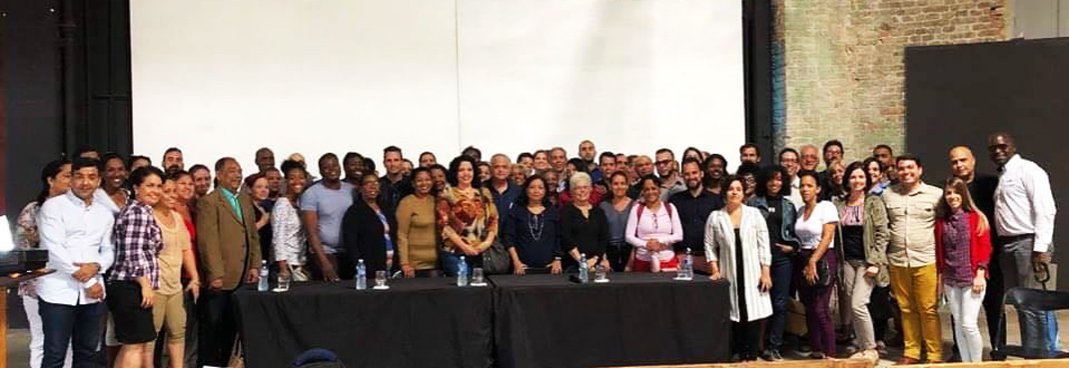
Text: CEAP collaboration
Considering the will of the private sector as a high strategic value for a city and reconciling concrete actions to transform not only the physical spaces but also the culture of life is magnanimous in these times. This was endorsed in the first workshop: governance from a public-private strategic alliance in Cuba. It was a meeting between the government and a large group of entrepreneurs from the capital.
The workshop, on this occasion, was convened by the Center for Public Administration Studies (CEAP), belonging to the Alma Mater of Cuban Higher Education. It’s part of a joint effort with the Public Administration Network of the aforementioned Center for the Study of Public Administration, and the Entrepreneurship and Innovation Network of the Center for the Study of the Cuban Economy, in a conjunction of efforts and interests.
The meeting was held in response to the need and demand to create a space for exchange in the interest of presenting, debating and exchanging needs, potentialities, experiences and proposals, among others, aimed at promoting local development projects, as well as fostering links between the State and non-State sectors and foreign investment.
Its development was attended by the Coordinator of Economy in the Government of Havana, Jorge Luis Villa, as well as the economic coordinators of all the municipalities of the province and some Municipal Directors of Labour. The University of Havana was represented by the Director of the Center for the Study of Public Administration and the Cuban Economy, Dr. Noris Tamayo Pineda and Dr. Betsy Anaya Cruz, respectively, as well as the Presidents of the Public Administration and Entrepreneurship Networks, belonging to each of the aforementioned, in addition to academics linked to each of the aforementioned research centers.
Among the more than 70 participants, and during 6 hours, assertive communication and immediate commitments prevailed. It is to carry out in the next months the First Exhibition Fair with an international scope. There the creators of goods and services by their own efforts will not only make known their products, but also offer all kinds of possibilities and opportunities for the community’s integral development; it was established the need to transform at local scale and through the interactions, in such a way that it reaches to energize the different sectors (state and non-state) as an intention prioritized in the Project of social economic development of the country.

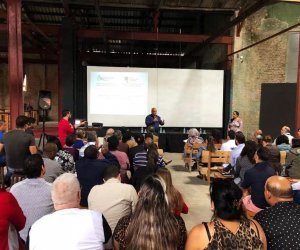
State Gastronomy: Everything in CUP

Gastronomic Services of State Commerce: Everything in CUP
It should be noted that there are more than 7000 state-run restaurants, bars and other catering establishments in the country, and only 10 % of them were allowed to sell in dual currency.
by Yaditza del Sol González
March 4, 2020
Translated and edited by Walter Lippmann for CubaNews.
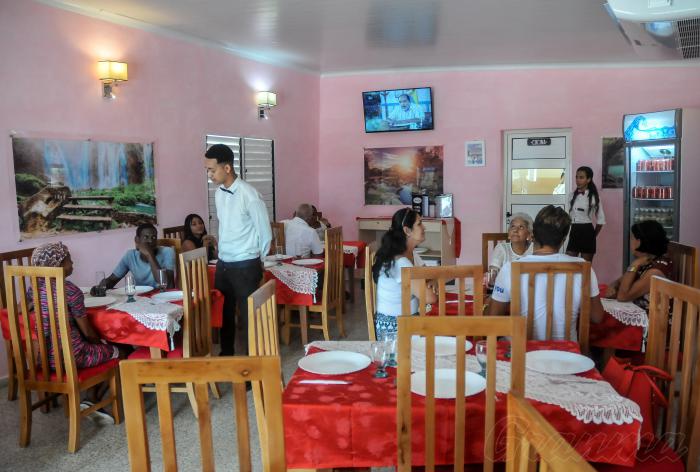
The elimination of cucumber sales in these establishments is intended to achieve greater control in the management of trade and gastronomic activities, as it allows a single accounting record to be established for the products marketed. Photo: Ariel Cecilio Lemus
The units of the state trade system that provide gastronomic services already carry out all their commercial activities in coupons, and payment in cucumbers is not appropriate for the purchase of certain products that were previously sold in this currency, such as beers, soft drinks, cigars, water, ice cream, jams and alcoholic beverages.
All these commercial actions will be carried out only in CUP, taking into account the current conditions of automation of the accounting systems of these units.
Arturo Vazquez, director of organization and systems of the Ministry of Interior Commerce (Mincin) explained that this measure is part of the improvement of retail trade of local subordination and does not include the chains of stores in foreign exchange, whether TRD, Palmares, Cimex or others, nor the Sylvain.
This is undoubtedly a measure that has caused great concern among readers, whether because of the lack of institutional communication prior to the effect of such a procedure, consumers’ concerns about the existence of exchange funds or about the conversion rate applied to goods.
According to the Deputy Minister of the sector, Miriam Perez, the elimination of the sale in CUC in these establishments is a response to the purpose of achieving greater control in the management of commerce and gastronomic activities, since it allows for the establishment of a single accounting record of the products marketed.
It should be pointed out that there are more than 7000 units in the country that carry out gastronomic activities on a State basis, i.e. bars, restaurants and others, and only 10% were authorized to sell in dual currency.
This group was selected as part of a scheme that, at the time, allowed the Trade to be self-financing in CUC, in addition to being an element of support for the budgets of other expenses, commented the Deputy Minister. This meant that, in the same restaurant, certain offers were paid in coupons and others in CUC, which had become a recurrent complaint from consumers.
Yosvany Pupo, general director of Services of the Mincin, explained that what was assumed is not part of a previous measure to the process of monetary unification, but that it responds to the improvement of the management of the commerce and cannot be analyzed out of that context. “In addition, there is no price increase in what we offer and, therefore, the Cadeca conversion rate of 1 CUC x 25 cup is applied,” he explained.
However, in the case of products that had official price lists in CUP, the price already established is assumed. For example, the domestically-produced canned soft drink, which used to be sold at .50 CUC, now costs 10 CUC, and not 12.50 CUC.
Offending Carriers Do Not Go Unpunished

Offending Carriers Do Not Go Unpunished
As a result of the allegations of popular control, an information note announced that measures were applied to 208 incumbents and contractors, the most frequent forms of indiscipline being price violations and travel restrictions.
March 4, 2020
Translated and edited by Walter Lippmann for CubaNews.

Some private individuals contribute to the movement of the population. Photo: Endrys Correa Vaillant
Cuba does not live with impunity, which is why the people feel supported by the measures taken against those who violate the stipulations of the Council of the Provincial Administration of Havana, regarding the maximum prices to be charged by private transporters circulating in the capital.
The General Directorate of Transport in Havana reported that 62 transport operation licenses had been withdrawn from the holders and 44 vouchers from their contracted workers, in addition to 199 contraventions.
As a result of complaints by the popular control, an informative note announced that measures were applied to 208 holders and contracted workers, with the most frequent forms of indiscipline being violations of prices and the limitation of trips.
Similarly, 11 vehicles were found to have committed repeated violations, to which cancellation measures were applied (table 1), as well as 45 vehicles whose drivers do not have an operating license (table 2).
In response to the country’s call to join forces in the fuel crisis caused by the impact of the U.S. blockade, it was also evident that some state car drivers remained non-compliant by not stopping at the places with the highest concentration of people.
In the month of February, 983 vehicles were reported and 773 measures were applied to different agencies and entities, including the ministries of Construction, Transportation, Public Health, Communications, Agriculture, Industry, Energy and Mines, Culture, Food Industry and Tourism, the Business Administration Group, Water Resources, as well as religious institutions and agencies.
Likewise, it is worth noting that there are still 46 entities that have not applied the measures corresponding to the offenders, which will be summoned to analysis by the Governor, as part of the approved organizational measures.
The population has the right to demand compliance with the provisions regarding maximum prices for private carriers.
In the event of non-compliance, it can report it through the different established channels, informing the registration number, date, time and place of the event, by telephone: 188820 or 7-881-9264 of Attention to the Population of the General Directorate of Transport.
Also, through the websites: www.dgtph.transnet.cu, of the General Directorate of Transport, and www.lahabana.gob.cu (the Citizen’s Portal).
Also, through the e-mails: oap@getrans.cu, centrollamadas@getrans.cu, and atencionciudadana@mitrans.gob.cu, of the Mitrans.
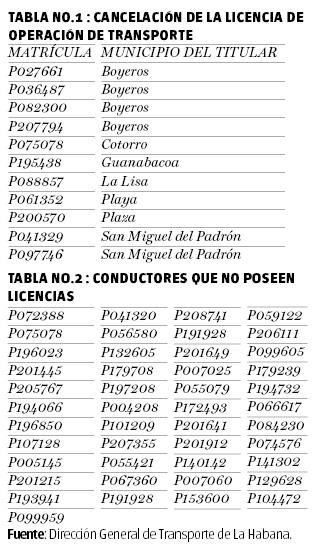
Evo Denounces Manouvers Against MAS

Evo Morales Denounces Maneuvers of
the De Facto Government Against MAS
The former president of Bolivia, Evo Morales, made this Tuesday, through his official Twitter account, a call to the international community to accompany the Bolivian people in the upcoming elections.
March 4, 2020
Translated and edited by Walter Lippmann for CubaNews.
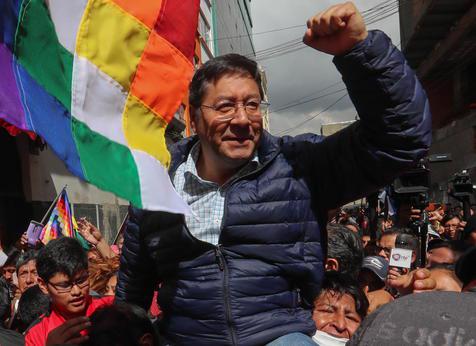
Thousands of people who support the Movement Towards Socialism joined to register the Arce-Choquehuanca binomial for the May 3 elections. Photo: ANSA
The former president of Bolivia, Evo Morales, made a call to the international community to accompany the Bolivian people in the upcoming elections through his official Twitter account on Tuesday.
Morales announced that the coup leaders will try to disqualify the candidates of the Movement Towards Socialism (MAS) before May 3rd.
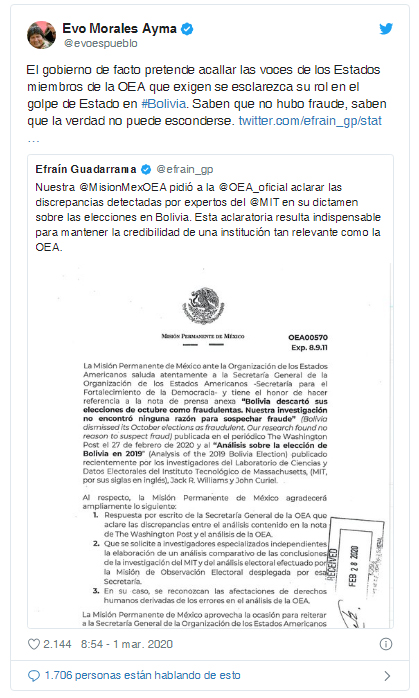
According to a survey released by the Bolivian TV channel ATB, MAS, which places former Economy Minister Luis Arce as a candidate for President and former Foreign Affairs Minister David Choquehuanca as Vice President, at a 32.6% voting intention.
Then comes Comunidad Ciudadana (cc), with 19.2%, which again presents Carlos Mesa as a candidate for President, and Gustavo Pedraza to be elected Vice President.
In the poll, the Juntos alliance also took a position, led by the self-proclaimed interim president, Jeanine Áñez, and Samuel Doria Medina, who accumulated 18.2%.
If these figures are repeated during the official vote, a second round of voting should be held. It is required that a candidate must have more than 50% of the votes or 40% with a 10-point lead over the runner-up to win directly.
Huawei Wants to Replace Google Search

Huawei Wants to Replace Google Search With Its Own Search Engine
March 4, 2020
Translated and edited by Walter Lippmann for CubaNews.

Huawei’s billboard at PT Expo, Beijing, China, October 31, 2019. Photo: Mark Schiefelbein/AP.
Replace Google Search. That is the purpose of Huawei, which is developing an Internet search engine for its mobile devices, according to the media XDA, which participated in the testing of the beta version of that application which the Chinese technology began to develop last week.
Huawei Search works as a basic search engine that helps to find websites, news, videos or images on the Internet, while offering shortcuts to consult information about the weather or currency exchange.
However, this solution is not connected to other programs, while Alphabet’s company search engine does have links to utilities such as “podcasts” or Google Assistant.
This service is operated by Aspiegel Limited -Huawei’s subsidiary in Ireland- and could work on the Chinese technology’s own search engine, without the need to incorporate external search programs.
Although at first the company invited anyone to participate in this initiative, as of February 29th it stopped the beta testing of Huawei Search because of its “concerns” related to the “misuse” of the app in social media.
The Chinese technology company has promoted this project because it cannot use certain US technology services since 2019.
It also happens that some Huawei mobiles cannot use certain Google services since last year, when the US government blacklisted the Chinese firm, preventing it from acquiring components from US companies without Washington’s approval.
Cuban Medical Collaborators in Chinese Hospitals

Cuban Medical Collaborators Resume Activities in Hospitals in China
March 1, 2020
Translated and edited by Walter Lippmann for CubaNews.
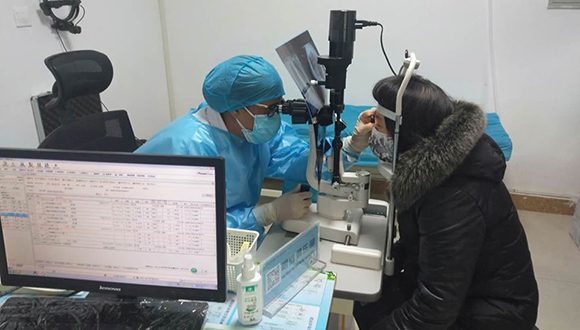
Cuban health workers in China. Photo: Cuban Medical Cooperation in China/Facebook.
Ophthalmologists from Cuba’s Medical Brigade in China have been continuing their assistance activities in three hospitals in the country since Tuesday, with responsibility and the necessary protection in the midst of the emergency caused by the outbreak of the Covid-19 coronavirus.
The mission, led by Dr. Yamira Palacios, confirmed that work was resumed after the suspensions adopted for security reasons, and as part of the national contingency plan implemented since late January.
She said in the social networks that the Cuban collaborators together with the Chinese health professionals are still linked despite the complex epidemiological situation in the country, with responsibility for their health care and protection to avoid exposure to the greatest risk.
The Brigade added that the priority is to prevent, maintain control and comply with the measures to confront the coronavirus.
This gesture is another sign of love, unity, solidarity and commitment,” she concluded.
The Cuban collaboration is developing with good results in ophthalmological centers installed in mixed hospitals in the provinces of Qinghai, Shanxi and Henan.
Official figures show that between 2012 and 2019 alone, more than 225,627 consultations and 13,546 surgeries were performed.
A couple of days ago, the Brigade reiterated its support and confidence in the efforts of the Chinese government to stop the Covid-19 in the shortest time possible. In addition, the Brigade to highlighted the discipline and compliance with the actions carried out by the health authorities of the Asian giant and those of the Cuban embassy here.
“To this day no Cuban in China has fallen ill. The result of hard teamwork. Counting on truthful and timely information without issuing a single opinion that was not supported by science, nor additional measures, without alarmism or collective panic,” he said.
She highlighted the reinforcement of the team with pediatric infectious disease doctor Ileana Alvarez and clinical infectious disease doctor Rafael Arocha. Both are recognized physicians of the Henry Reeve Contingent and whose incorporation was considered another sign of kindness and solidarity of the Cuban health system.
“We will continue on the path that will lead us to control this contagious and still unknown disease (…) that has filled the Chinese people with pain, sadness, and uncertainty,” he said.
Dr. Palacios, along with Alvarez and Arocha, are in charge of the medical post established in the Caribbean island’s embassy to reinforce health care for compatriots in China in the midst of the emergency due to the outbreak.
The team provides assistance and consultations, follows up on the current epidemiological situation, and also supports the preventive work that the diplomatic mission implemented in order to be more effective in guiding and protecting its fellow countrymen.

Cuban health workers in China. Photo: Cuban Medical Cooperation in China/Facebook.
For a More Inclusive Society

For a More Inclusive Society
The 5th Congress of the Cuban Association of the Deaf takes place at the Havana Convention Center
By Liudmila Peña Herrera
March 4, 2020
Translated and edited by Walter Lippmann for CubaNews.

Cuba offers an inclusive education Author: Taken from the Internet Published: 04/03/2020 | 12:40 am
The demand of the deaf community that Cuban sign language be accepted as an official language, along with Spanish, was evident on the first day of the 5th Congress of the Association of the Deaf of Cuba (ANSOC), which is in session at the Havana Convention Center since Tuesday.
The speakers highlighted the richness of this form of communication, the academic research on its development and the need for families to have the opportunity to study and communicate through it, as it is a symbol of inclusion.
In one of the panels at the conference, aspects related to the linguistics of Cuban sign language and the culture of the deaf community, the methodology for teaching it to children, society’s knowledge of the potentialities and needs of these people, as well as the importance of sign language being protected by law were addressed.
In this sense, Leonardo Pérez Gallardo, professor of Civil Law at the University of Havana, reflected that in its Article 42, the Constitution prohibits any type of discrimination on the basis of disability, and one of the specific manifestations of disability is hearing.
A touching moment was the presentation of the video clip Soy el verso, with music by Telmary, performed in sign language, and the message that the artist sent, from there, to her colleagues: “It is important that society hears the concerns of the deaf community and the efforts made in the country in their favor. I hope that many artists can join in”.
The first day of the Congress was attended by Jorge Cuevas Ramos, member of the Secretariat of the Central Committee of the Party; Marta Elena Feitó Cabrera, Minister of Labour and Social Security; Joseph Murray, President of the World Federation of the Deaf; Fermín Quiñones Sánchez, President of the Cuban Association of the United Nations; and Alejandro Marzo Peña, President of the ANSOC.
Subscribe to Blog via Email
| M | T | W | T | F | S | S |
|---|---|---|---|---|---|---|
| 1 | ||||||
| 2 | 3 | 4 | 5 | 6 | 7 | 8 |
| 9 | 10 | 11 | 12 | 13 | 14 | 15 |
| 16 | 17 | 18 | 19 | 20 | 21 | 22 |
| 23 | 24 | 25 | 26 | 27 | 28 | |

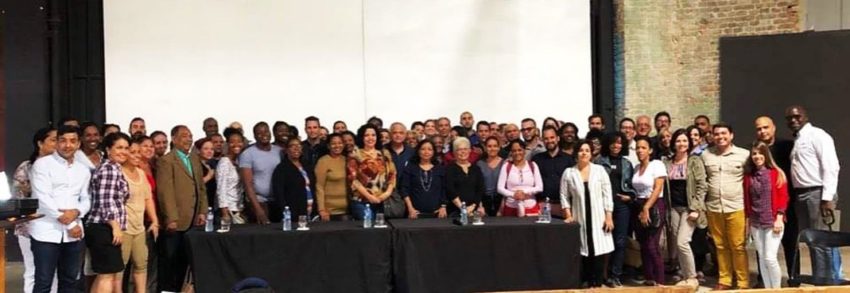
You must be logged in to post a comment.